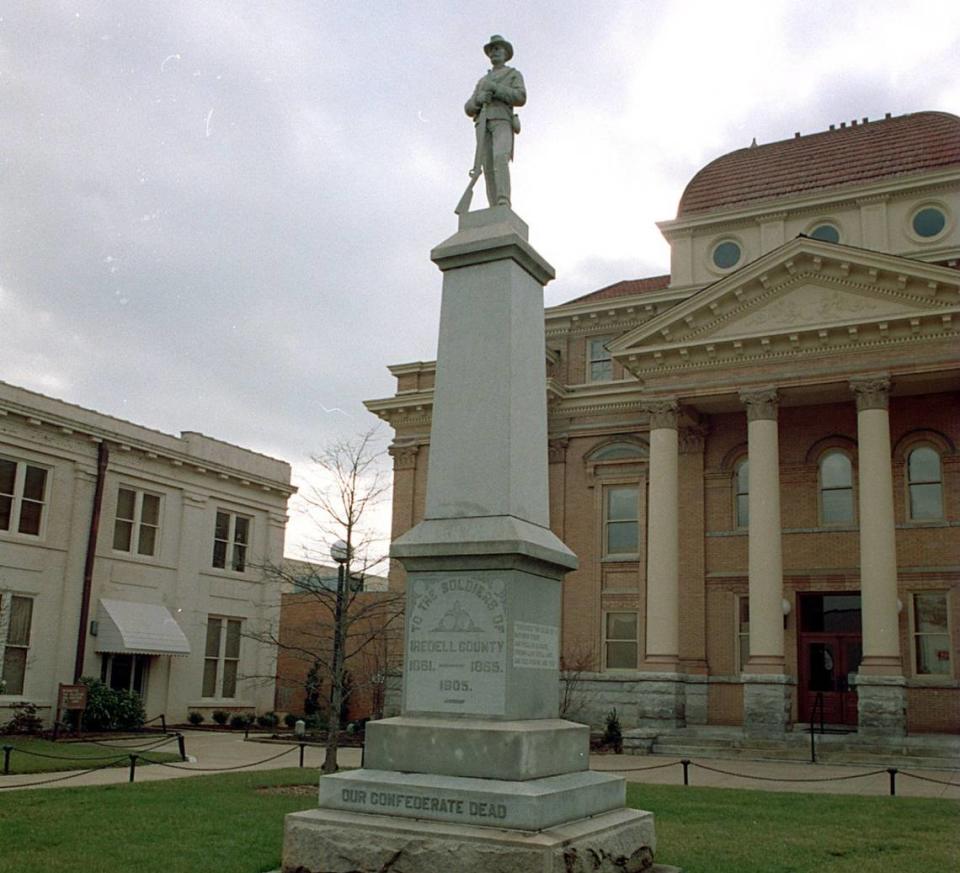Robert E. Lee descendant joins legal fight to remove Confederate statue from NC site
A multiracial lawsuit demanding the removal of a Confederate monument in Iredell County offers a historic family twist.
One of the residents supporting the move is a descendant of Robert E. Lee.
The Rev. Robert Wright “Rob” Lee IV of Statesville, a fourth great-nephew of the Confederacy’s commanding general, is among a group of residents and organizations calling on Iredell County to remove the statue of the Confederate soldier from government property in downtown Statesville.
The Iredell memorial and hundreds like it have long been a symbol of the South’s mythic “Lost Cause.”
But in a statement accompanying the lawsuit, Lee called the statue “a celebration of white supremacy and racism.”
The complaint, filed Tuesday by a consortium of attorneys from Statesville, Charlotte, Raleigh, Durham, San Francisco and Washington, calls on the Iredell courts to order the Iredell Board of County Commissioners to move the statue from the grounds of the Government Center, the former county courthouse.

On March 2, the commissioners appeared to begin the process of finding the statue a new home.
Two weeks later, the board backtracked. According to the Iredell Free News, commission Chairman James Mallory said the earlier 4-1 vote had been misconstrued — that the commissioners had expressed only a willingness to work with the United Daughters of the Confederacy if the group decided to move the statue. Instead, the UDC refused.
“The Iredell County Board of Commissioners is not moving the Confederate monument,” Mallory said.
Now, Mallory has been named in the lawsuit, along with fellow commissioners Melissa Neader, Marvin Norman, Gene Houpe and Scottie Brown. The complaint also lists Iredell County as a defendant.
Mallory did not respond to an Observer email seeking comment Tuesday.
Lee and the other plaintiffs, including state and local chapters of the NAACP, the Iredell Clergy for Healing and Justice along with Christopher “Skip” McCall, a longtime Black resident of Statesville, argue that the statute has become a magnet for violence and crime, and that the cost of maintaining and protecting it is an unconstitutional expense on taxpayers.
They also say that by letting the statute stand, the defendants are both violating equal-protection guarantees and racially discriminating against Black residents, among other claims.
The complaint not only calls for the removal of the statue from the Government Center grounds but wants it banned from being relocated on any piece of county-owned or controlled property.

Confederate statue has long history
The Iredell memorial to the county’s Confederate dead was dedicated in 1906, as Jim Crow laws restricting legal rights of Blacks returned to North Carolina and much of the South.
The statue honors some 600 Confederate soldiers from Iredell County who, according to the inscription, “fell in a cause, though lost, still just, and died for you and me.”
Protests against the Iredell statue — as well as similar memorials, streets and buildings across the South honoring Confederate heroes — escalated last summer, in the weeks after the police killing of George Floyd in Minneapolis.
As of now, some 40 monuments to the old Confederacy stand at or near county courthouses in North Carolina. More than 150 Confederate symbols are displayed on public property across the state, a number that, according to the Southern Poverty Law Center, trails only Georgia and Virginia.
In November, a similar lawsuit called for the removal of all of the Confederate memorials from North Carolina courthouses, starting in Gaston County.
In Statesville, demonstrations for and against the memorial led to skirmishes and arrests.
In March, after commissioners ostensibly voted to move the statue, counter protesters riding through downtown threw a noose at activists supporting removal, according to the complaint.
That same month, fliers purporting to be from the Ku Klux Klan were left at the homes of some leaders of the anti-statue movement, the Observer has reported.
Mom says NC police chief told her ‘throw it away’ after KKK bag showed up at her door
Likewise, the response to the commissioners’ announcement that the statue would stay put also was sharply cleaved by racial and philosophical lines, according to the Free News.
“(The monument) has caused great anguish to people of color in our community. Do we want a significant part of our community to endure the pain of walking past this monument?” said the Rev. Steve Shoemaker, a former Charlotte minister who is now a member of the Iredell Clergy for Healing and Justice.
On the other side, there were residents like Tommy Hamel.
“These people (anti-monument protesters) have done nothing but start trouble in this town, and what you’ve done, playing both sides, is only going to make it worse. We want some honesty and stability,” Hamel told the commissioners.
“We’re tired of being told we’re racist because we’re white and we’re carrying a Confederate flag. No more cancel culture, no more Black Lives Matter.”
Lee, a minister and author, has become an outspoken critic of public memorials to the elements of the Confederacy still entwined in his family heritage.
“(It’s) something we Southerners are never taught,” he wrote in a June column for the Washington Post. “The Civil War was fought for states’ rights to enslave African people in the United States of America.”
In his statement for the lawsuit, Lee said the Iredell statue makes it difficult to bring visitors to downtown Statesville.
“Especially if they are people of color,” he said. “Especially if they know the history.”

